Guest bloged by Emily Levy
Judge Yuri Hofmann announced in his San Diego courtroom today that he will take the constitutional and jurisdictional matters of the CA-50 election challenge case under advisement and issue a ruling next Tuesday, August 29.
The first item up for consideration today in the election contest filed by Attorneys Paul Lehto and Ken Simpkins on behalf of two San Diego voters (and truly on behalf of all of us) was a defense motion for dismissal. Defense claimed that the San Diego court has no jurisdiction in this matter because the Constitution says, “Each House shall be the judge of the elections, returns and qualifications of its own members…” (Article I, Section 5). In other words, The House of Representatives gets to pick its members. (Who really needs elections, anyway?)
Lehto, in response, argued--as outlined here--that if the court has no jurisdiction, then Registrar of Voters Mikel Haas also had no jurisdiction to certify the election, given that certification happened after Bilbray was sworn in. (Yes, you heard that right.)
The defendants also argued that the court has no jurisdiction because plaintiffs had abandoned their recount efforts. According to Lehto, the request for a recount was filed properly within five days of certification of the election. Lehto says, "Jurisdiction was created by filing. That's all the statute says. There is no abandonment rule."
The judge is expected to rule on both the constitutional and jurisdictional issues on Tuesday.
From the courthouse by cell phone plaintiff Barbara Gail Jacobsen reported, "Paul Lehto and Ken Simpkins represented us very well today in court. Lehto said it's invading the sovereignty of the State if someone swoops in and swears the person in and then says there’s nothing you can do. I thought he made some very good arguments about upholding checks and balances in our system and standing up for the right of the people to make sure that elections are accountable. We the People of this country decide on who is going to represent us, and it’s through making sure that our elections are sound that we can know for sure that we have elected people that we want to transfer power to. In this particular case what Paul Lehto was trying to say is that the people's right to know if the election was properly carried out is being blindfolded and taken away by the other side."
We can only hope that before Tuesday Judge Hofmann will have the opportunity to read the rest of the Constitution. It could be enlightening.
Donations are still needed for the lawsuit and other efforts in California’s 50th District to fight the illegal June 6 election. For more information, go to nosleepovers.org.
UPDATE: We have another report of the day's proceedings, this one from Judy Hess of CA 50 Action Committee:
We had our hearing this afternoon, and we are still alive! The judge ordered argument on whether he has jurisdiction in this case, based on Bilbray’s arguments that the US Constitution says the House and Senate judge who belongs in their chambers.
Bilbray’s argument goes like this: The Constitution calls for each chamber to judge its members. Since Brian Bilbray was sworn in on June 13 (before the votes were all counted, and 17 days before the certification) this judge has no jurisdiction and would be a violation for the court to judge that which properly belongs to the legislative branch.
WELL! All that sounds great until you hear Mr. Lehto argue. Oh my, what a case he presented.
His argument? That if Bilbray’s argument is correct, then everything is topsy turvy (my term, not his!). Saith he, read the rest of the Constitution, meant to be interpreted in its entirety.
The Constitution reserves for the states the method and timing of the federal elections. That includes counting the votes – that means finish counting the votes. That means if you have a contest you have to recount the votes, and until you have done that, the state’s right to exercise its obligations under the constitution are not met.
So, if you still agree with Mr. Bilbray, then you must conclude that all that is needed to cut off the state’s right to its procedures is rush to swear in! Who cares if the count is accurate? Who cares if the ROV played games? Who cares if the PEOPLE are not able to select the candidate of their choice through the election process fully played out?
If rushing to swear in wrests the ability to count votes away from hands of the people, then what is the point of certification? It is rendered null, without point, without gravitas. What the heck, what is the point of voting? Let the Registrar “elect” (select?) our representatives to the House.
And to the judge, he cautioned, how can it be that a rush to swear in a candidate, an act of the legislature (House) is of no consequence to the courts? How can the House render this judge (State Judge) powerless, when the Constitution says we Californians get to count our votes according to processes the Constitution says we get to set!
I have put this in plain terms.
Paul’s argument was so eloquent that I found myself on the verge of mistiness at one point. My words tell you much of the argument— but I can’t do the presentation justice. He has set up the classic tensions, though, between different parts of the Constitution, and also the tensions between Federal and States’ rights.
This argument was so well done, that about three quarters of the way through, I finally put down my pen and just listened and enjoyed. I knew I was watching a little slice of history, and I didn’t want to miss it “working”. But I got the gist of it for you and will transcribe my notes later.
The great news is that the judge paid close attention. Paul had him really engaged at some points. The judge has taken the issue “under submission”. Meaning he has to think about it, do some research or have it done for him, before he decides.
At 1:30 pm Tuesday, we’ll be back in court, and he will announce his decision whether he has jurisdiction to decide this case, or whether the power of the Federal government is plenary (or supreme), under our facts.
If he gives us the go ahead, then he will hear other argument, and presumably will decide what documents we can get from the ROV.
So we wait. Waiting is the hardest.
Judy Hess
Coordinator
CA 50 Action Committee
www.nosleepovers.org
"Democracy is two wolves and a lamb voting on what to have for lunch. Liberty is a well armed lamb contesting the vote."
-- Benjamin Franklin 1759


 No Way Home: Trump's Iran War a Spreading, Chaotic, Deadly, Disaster: 'BradCast' 3/3/26
No Way Home: Trump's Iran War a Spreading, Chaotic, Deadly, Disaster: 'BradCast' 3/3/26 'Green News Report' 3/3/26
'Green News Report' 3/3/26
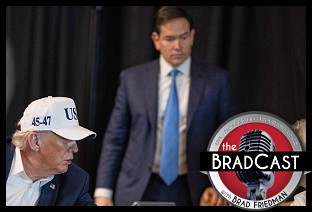 Trump Attacks Iran in 'Operation Epstein Fury': 'BradCast' 3/2/26
Trump Attacks Iran in 'Operation Epstein Fury': 'BradCast' 3/2/26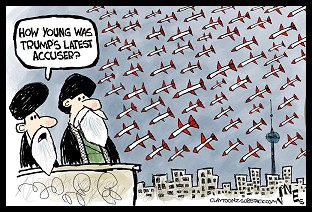 Sunday 'No, More Wars!' Toons
Sunday 'No, More Wars!' Toons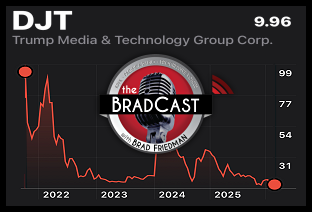 Loser Trump's Unlawful Tariffs, Failed Media Company, Corrupt SCOTUS: 'BradCast' 2/26/26
Loser Trump's Unlawful Tariffs, Failed Media Company, Corrupt SCOTUS: 'BradCast' 2/26/26 'Green News Report' 2/26/26
'Green News Report' 2/26/26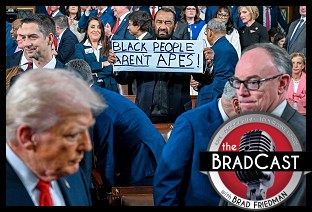 The State of the Union is ... Insane.
The State of the Union is ... Insane.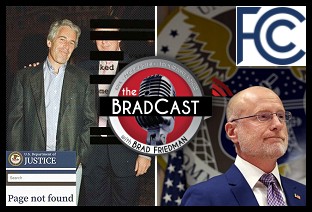 FCC's New 'Threat' to Broadcasters; NPR Confirms DOJ's 'Missing' Trump 'Rape' Docs: 'BradCast' 2/24/26
FCC's New 'Threat' to Broadcasters; NPR Confirms DOJ's 'Missing' Trump 'Rape' Docs: 'BradCast' 2/24/26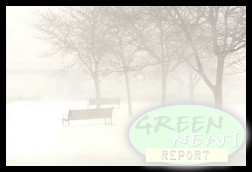 'Green News Report' 2/24/26
'Green News Report' 2/24/26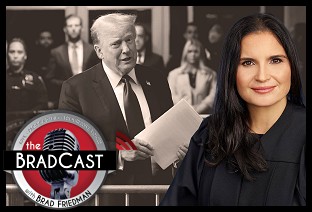 Aileen Cannon May be Covering Up Evidence of Trump Rape: 'BradCast' 2/23/26
Aileen Cannon May be Covering Up Evidence of Trump Rape: 'BradCast' 2/23/26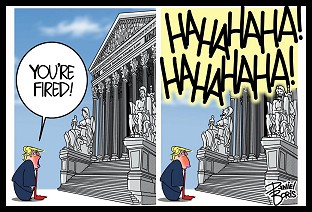 Sunday 'Plan B' Toons
Sunday 'Plan B' Toons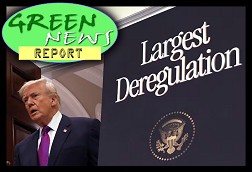 'Green News Report' 2/19/26
'Green News Report' 2/19/26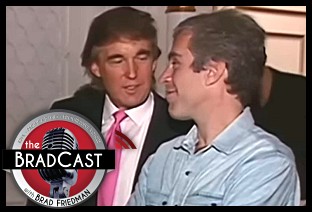 DOJ Hiding Evidence of Trump Rape, Assault Allegations: 'BradCast' 2/19/26
DOJ Hiding Evidence of Trump Rape, Assault Allegations: 'BradCast' 2/19/26 'No More Fig Leaves': Antisemitism Rising Inside MAGA, GOP: 'BradCast' 2/18/26
'No More Fig Leaves': Antisemitism Rising Inside MAGA, GOP: 'BradCast' 2/18/26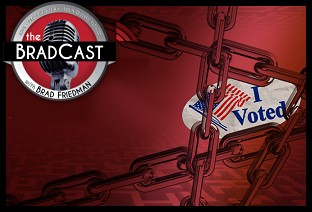 'SAVE America Act' Designed to Save GOP, Undermine Democracy: 'BradCast' 2/17/26
'SAVE America Act' Designed to Save GOP, Undermine Democracy: 'BradCast' 2/17/26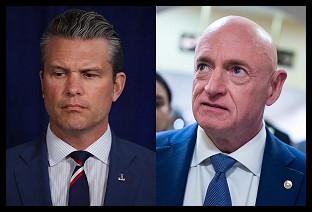 Court Blocks Hegseth Censure of Sen. Kelly
Court Blocks Hegseth Censure of Sen. Kelly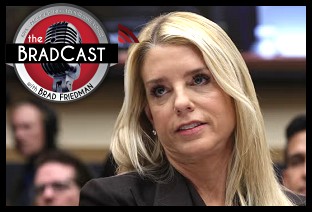 Harpy Tantrums, Legal Losses, Election Fails, Retreating ICE: 'BradCast' 2/12/26
Harpy Tantrums, Legal Losses, Election Fails, Retreating ICE: 'BradCast' 2/12/26 Trump to Reverse EPA's Landmark 'Endanger-ment Finding': 'BradCast' 2/11/26
Trump to Reverse EPA's Landmark 'Endanger-ment Finding': 'BradCast' 2/11/26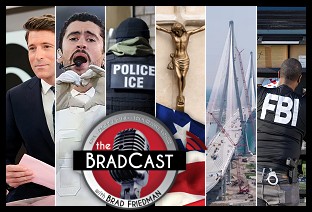 Trump's Racism, Corruption, 'Culture War': 'BradCast' 2/10/26
Trump's Racism, Corruption, 'Culture War': 'BradCast' 2/10/26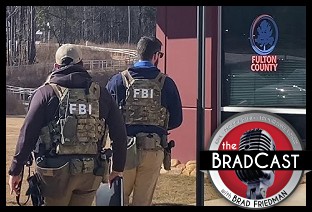 About Trump's FBI Raid of Fulton County, GA Election Hub: 'BradCast' 2/9/26
About Trump's FBI Raid of Fulton County, GA Election Hub: 'BradCast' 2/9/26
 VA GOP VOTER REG FRAUDSTER OFF HOOK
VA GOP VOTER REG FRAUDSTER OFF HOOK Criminal GOP Voter Registration Fraud Probe Expanding in VA
Criminal GOP Voter Registration Fraud Probe Expanding in VA DOJ PROBE SOUGHT AFTER VA ARREST
DOJ PROBE SOUGHT AFTER VA ARREST Arrest in VA: GOP Voter Reg Scandal Widens
Arrest in VA: GOP Voter Reg Scandal Widens ALL TOGETHER: ROVE, SPROUL, KOCHS, RNC
ALL TOGETHER: ROVE, SPROUL, KOCHS, RNC LATimes: RNC's 'Fired' Sproul Working for Repubs in 'as Many as 30 States'
LATimes: RNC's 'Fired' Sproul Working for Repubs in 'as Many as 30 States' 'Fired' Sproul Group 'Cloned', Still Working for Republicans in At Least 10 States
'Fired' Sproul Group 'Cloned', Still Working for Republicans in At Least 10 States FINALLY: FOX ON GOP REG FRAUD SCANDAL
FINALLY: FOX ON GOP REG FRAUD SCANDAL COLORADO FOLLOWS FLORIDA WITH GOP CRIMINAL INVESTIGATION
COLORADO FOLLOWS FLORIDA WITH GOP CRIMINAL INVESTIGATION CRIMINAL PROBE LAUNCHED INTO GOP VOTER REGISTRATION FRAUD SCANDAL IN FL
CRIMINAL PROBE LAUNCHED INTO GOP VOTER REGISTRATION FRAUD SCANDAL IN FL Brad Breaks PA Photo ID & GOP Registration Fraud Scandal News on Hartmann TV
Brad Breaks PA Photo ID & GOP Registration Fraud Scandal News on Hartmann TV  CAUGHT ON TAPE: COORDINATED NATIONWIDE GOP VOTER REG SCAM
CAUGHT ON TAPE: COORDINATED NATIONWIDE GOP VOTER REG SCAM CRIMINAL ELECTION FRAUD COMPLAINT FILED AGAINST GOP 'FRAUD' FIRM
CRIMINAL ELECTION FRAUD COMPLAINT FILED AGAINST GOP 'FRAUD' FIRM RICK SCOTT GETS ROLLED IN GOP REGISTRATION FRAUD SCANDAL
RICK SCOTT GETS ROLLED IN GOP REGISTRATION FRAUD SCANDAL VIDEO: Brad Breaks GOP Reg Fraud Scandal on Hartmann TV
VIDEO: Brad Breaks GOP Reg Fraud Scandal on Hartmann TV RNC FIRES NATIONAL VOTER REGISTRATION FIRM FOR FRAUD
RNC FIRES NATIONAL VOTER REGISTRATION FIRM FOR FRAUD EXCLUSIVE: Intvw w/ FL Official Who First Discovered GOP Reg Fraud
EXCLUSIVE: Intvw w/ FL Official Who First Discovered GOP Reg Fraud GOP REGISTRATION FRAUD FOUND IN FL
GOP REGISTRATION FRAUD FOUND IN FL

































